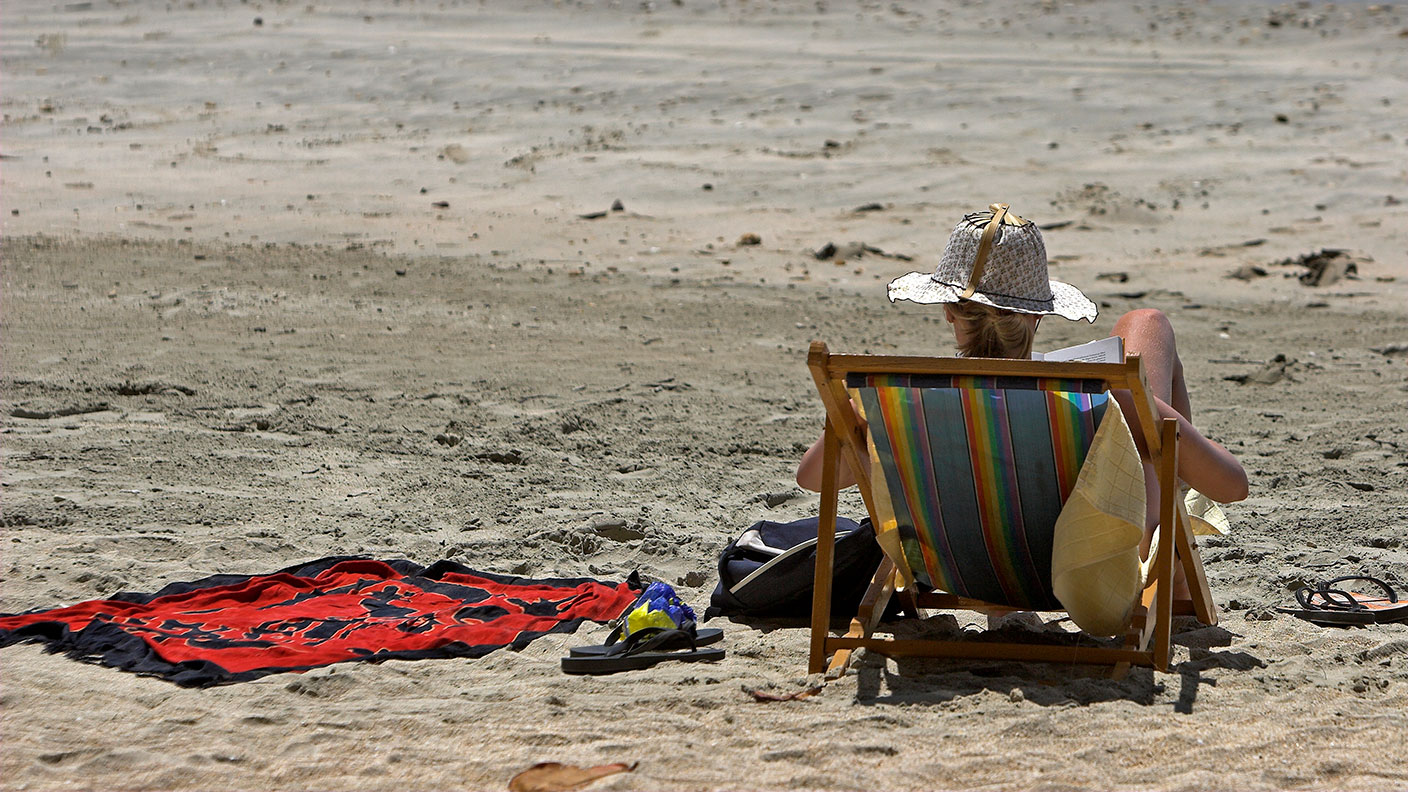Five books to make you think this Christmas
Merryn Somerset Webb picks five books on the theme of ownership for you to read over the festive period.


Get the latest financial news, insights and expert analysis from our award-winning MoneyWeek team, to help you understand what really matters when it comes to your finances.
You are now subscribed
Your newsletter sign-up was successful
Want to add more newsletters?

Twice daily
MoneyWeek
Get the latest financial news, insights and expert analysis from our award-winning MoneyWeek team, to help you understand what really matters when it comes to your finances.

Four times a week
Look After My Bills
Sign up to our free money-saving newsletter, filled with the latest news and expert advice to help you find the best tips and deals for managing your bills. Start saving today!
If you have a house full of kids, there’s a word you probably hear a lot at Christmas: “mine”. You’ll hear it in the context of new toys unwrapped on the day; old toys being protected from rowdy cousins; cracker trinkets grabbed when they fall to the floor; and, of course, in the context of contested board games.
You’ll also hear versions of it from the adults: “This is my kitchen and we’ll make the sprouts my way”, and so on. There’s a lot of ambiguity here and an awful lot of potential for conflict too: if you bought the kitchen with an early inheritance from your mother and she’s in the kitchen too, does she get a say?
The grey areas of ownership
With wishes for a harmonious holiday for you all then, my first book suggestion for your Christmas gift list is Mine: How the Hidden Rules of Ownership Control Our Lives by Michael Heller and James Salzman. We tend to think of ownership as something genuinely binary: something is either mine or it’s yours. But it isn’t so; instead, in many cases it is more of a “storytelling battle”. For example, who owns the bit of space that an airline seat reclines into — the person who has their knees already in it, or the person who wants to move their seat back into it?
MoneyWeek
Subscribe to MoneyWeek today and get your first six magazine issues absolutely FREE

Sign up to Money Morning
Don't miss the latest investment and personal finances news, market analysis, plus money-saving tips with our free twice-daily newsletter
Don't miss the latest investment and personal finances news, market analysis, plus money-saving tips with our free twice-daily newsletter
Who owns your data? Who owns a book you bought for your Kindle if Amazon can turn it off at any point? If you own a piece of land, but other people have right of way over it or, as in much of the US, to forage on it, do you really own it? And if you want to get clean water from land, where the owners aren’t the end users of that water, how do you make them feel like they own it, so they keep it clean?
There’s a toolkit for the answers (six ways to make something yours), say Heller and Salzman, but the key point is that societies design their own rules of ownership — and getting that design right is the key to success.
Capitalism's nasty flaws
Peter Barnes, author of our next book, Ours: The Case for Universal Property, reckons much of today’s design is wrong — and hence limiting our potential: he has form in the ownership debate game — one of his previous books is called Who Owns the Sky.
Barnes argues that capitalism has two nasty flaws: it widens existing inequalities and it is “destructive of nature”. The need to repair capitalism is, he says, “indisputable”. The solution is to recognise that the majority of the wealth of developed societies has little to do with our current efforts: it is instead a function of the ecosystems that exist naturally and of the social assets built by previous generations — the rule of law, our banking systems and so on.
Things would be better if all these assets existed as universal property — held not privately and not by the state, but in a type of trust that charges all those who benefit from the work of past generations (and of nature) and pays out to the population as a whole equally.
So a financial transaction levy would be paid into the trust for example — as a rough structure think of the Alaska Permanent Fund which shares Alaska’s oil wealth out among all its residents.
I’m not sure I buy his depressing diagnosis in full. Our current system has brought the share of the world population living in absolute poverty down from 44 per cent 60 years ago to under 10 per cent now.
And why does rising inequality matter so much, if overall poverty levels are falling fast at the same time? Sometimes it is the absolutes that matter. Still, the idea that too many individuals find ways to benefit from what is really communal wealth is compelling. It is why I am in favour of a land value tax, for example, and I suspect it is gaining ground. You should know the arguments.
Why “stakeholders” shouldn't trump shareholders
The same goes for those put forward in Vivek Ramaswamy’s Woke Inc: Inside the Social Justice Scam. (Listen to me and Vivek talking about this in more depth on the MoneyWeek Podcast here.)The world is currently full of calls for individual ownership to be diluted one way or another — and the idea that companies should knock shareholders off the top of their priority lists in favour of stakeholders is a major part of that.
Ramaswamy is having none of it. This is a concept, he says, that allows big companies to get in on politics, something that really isn’t any of their business; which provides too much cover for hypocrisy; and (crucially) which interferes with democracy.
“We shouldn’t let self-interested corporations and politicians divide us with skin-deep identities and cheap social causes,” he says. Perhaps companies should leave politics to the politicians and get on with what should be their actual purpose: make stuff, sell it, do both well, return money to their actual owners — shareholders.
The fall of empire
Next, you should read George Maher’s fabulous Pugnare: Economic Success and Failure, a History of the Roman Empire written from a financial perspective. (You can hear me talk to George on the MoneyWeek Podcast here.) Ownership design was as crucial 2,000 years ago as it is now.
Roman economic growth was based on two vital (and new) things: outright property ownership (no universal property here) and a stable, globally recognised money system. For most of the empire’s history the money you owned could be trusted to maintain its purchasing power.
When inflation kicked in at the end of the second century, as soldier salaries soared and the denarius was debased, economic stability collapsed along with the currency. The banking system appears to have completely failed in AD260 says Maher.
And that was that. One to give to anyone who you would like to be less blasé about the resilience of our institutions than they are and to worry more about inflation than they do. A central banker perhaps.
Imaginary islands
Finally for fun, a reminder of how easily mistakes can get stuck in our thinking — The Un-discovered Islands by Malachy Tallack. It’s a run-through of all the islands that have turned up on maps over the centuries — but then turned out not to exist.
Think Thule, apparently discovered somewhere north of Shetland by the ancient Greek explorer Pytheas and firmly believed in by Pliny (who told his readers that on Thule there was “no night at the summer solstice”). It doesn’t exist, nor does Bermeja, an island that appeared on maps off the Yucatán peninsula for hundreds of years — and was eventually removed in 1997.
This is a travel book. But not one that will upset you as much as some others. As none of the islands actually exist, no one can own them, and lockdown or no lockdown you can’t go to them. You might find that quite relaxing. I did.
• This article was first published in the Financial Times
Get the latest financial news, insights and expert analysis from our award-winning MoneyWeek team, to help you understand what really matters when it comes to your finances.

-
 Average UK house price reaches £300,000 for first time, Halifax says
Average UK house price reaches £300,000 for first time, Halifax saysWhile the average house price has topped £300k, regional disparities still remain, Halifax finds.
-
 Barings Emerging Europe trust bounces back from Russia woes
Barings Emerging Europe trust bounces back from Russia woesBarings Emerging Europe trust has added the Middle East and Africa to its mandate, delivering a strong recovery, says Max King
-
 Holiday reading: five books to make sense of the 1970s – and the 2020s
Holiday reading: five books to make sense of the 1970s – and the 2020sReviews With raging inflation, booms, busts and political crises, the 1970s has a reputation as a relentlessly awful decade. But things aren’t that simple, says Merryn Somerset Webb. Here, she picks five books to put it all in context.
-
 Disasters, bunkers and financial collapse: a little not-so-light holiday reading
Disasters, bunkers and financial collapse: a little not-so-light holiday readingReviews Merryn Somerset Webb picks a selection of books for you to dive into wherever you are holidaying this summer.
-
 Why equities are better investments than art
Why equities are better investments than artOpinion We’re often told that buying art is a good way of diversifying your investment portfolio. But, says Merryn Somerset Webb, art has no income stream and is impossible to value accurately.
-
 Four excellent books to get your teeth into while you remain holed up
Four excellent books to get your teeth into while you remain holed upReviews Whether you’re going on a staycation (or even an actual holiday) or remaining holed up at home. Merryn Somerset Webb has four perfect books to educate and entertain you.